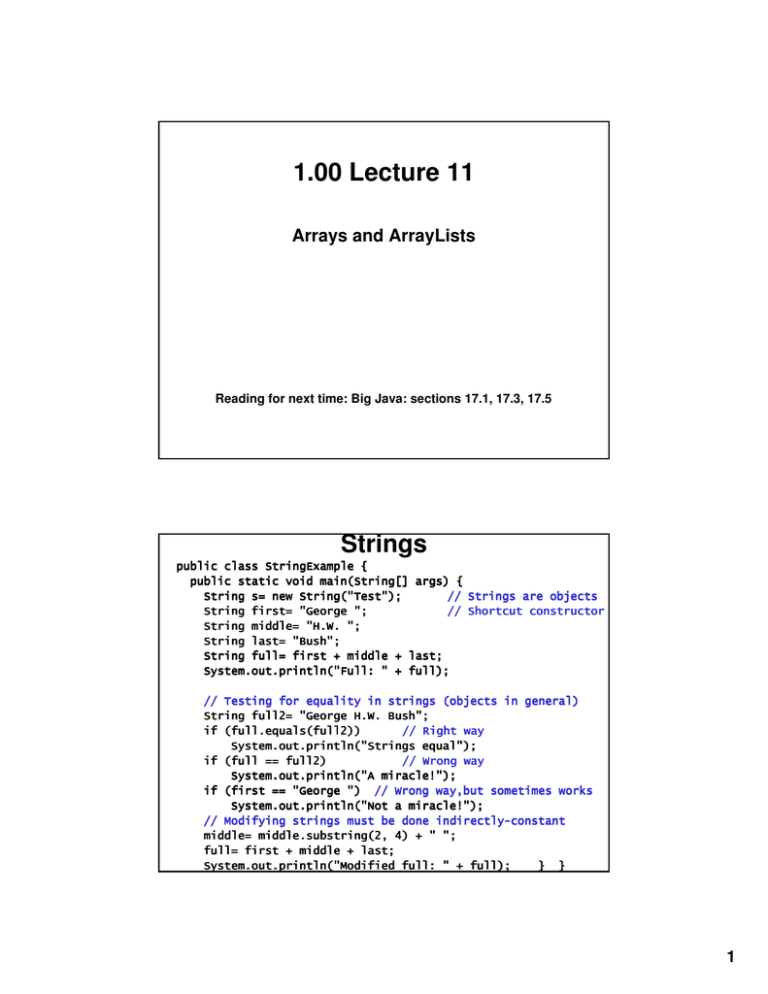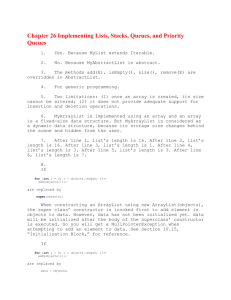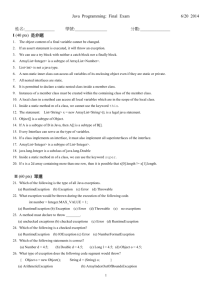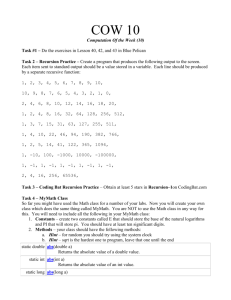1.00 Lecture 11 Strings Arrays and ArrayLists
advertisement

1.00 Lecture 11
Arrays and ArrayLists
Reading for next time: Big Java: sections 17.1, 17.3, 17.5
Strings
public class StringExample {
public static void main(String[] args)
args) {
String s= new String("Test");
// Strings are objects
String first= "George ";
// Shortcut constructor
String middle= "H.W. ";
String last= "Bush";
String full= first + middle + last;
System.out.println("Full:
System.out.println("Full: " + full);
// Testing for equality in strings (objects in general)
String full2= "George H.W. Bush";
if (full.equals(full2))
// Right way
System.out.println("Strings equal");
if (full == full2)
// Wrong way
System.out.println("A miracle!");
if (first == "George ") // Wrong way,but sometimes works
System.out.println("Not a miracle!");
// Modifying strings must be done indirectly­
indirectly­constant
middle= middle.substring(2, 4) + " ";
full= first + middle + last;
System.out.println("Modified full: " + full);
} }
1
Arrays
• Arrays are a simple data structure
• Arrays store a set of values of the same type
– Built-in types (int, double, etc.) or
– Objects (Students, Dates, etc.)
• Arrays are part of the Java language
– Arrays are objects, not primitives like int or double.
double
– They are declared in the same way as other objects
int[]
int[] intArray=
intArray= new int[20];
– The array object has an integer data member,
length, that gives the number of elements in the
array:
int aSize=
aSize= intArray.length;
intArray.length;
// aSize=
aSize= 20
• Each value is accessed through an index
intArray[0]= 4; intArray[1]= 77;
Arrays, p.2
– Array indexes start at 0, not 1
• An array with N slots has indices 0 through N-1
• intArray has elements intArray[0] through intArray[19]
– Array lengths cannot be changed once they are declared
– Arrays can be initialized when declared
int[]
// Length 7
int[] intArray=
intArray= {5, 77, 4, 9, 28, 0, ­9};
// Note that ‘new’ is implicit (not needed) in this case
– To copy an array, use arraycopy
int[]
// Can be diff size
int[] newArray=
newArray= new int[15];
// arraycopy(fromArray,
arraycopy(fromArray, fromIndex,
fromIndex, toArray,
toArray, toIndex,
toIndex, count)
System.arraycopy(intArray,
System.arraycopy(intArray, 0, newArray,
newArray, 0, 15);
// Now intArray and newArray have separate copies of data
– If we had just defined newArray without copying:
int[]
int[] newArray=
newArray= intArray;
intArray;
// This sets intArray[2]= ­44 also
newArray[2]= ­44;
// intArray and newArray would just be two names for the
// same array. Remember Java names are references
2
Test Your Knowledge
1. Which of the following expressions does not declare and
construct an array?
a. int[ ] arr = new int[4];
b. int[ ] arr;
arr = new int [4];
c. int[ ] arr = {1,2,3,4};
d. int[ ] arr;
2. Given this code fragment:
int j= ?;
int[]
int[] data = new int[10];
System.out.print(data[ j ]);
Which of the following is a legal value of j?
a. -1
b. 0
c. 1.5
d. 10
Test Your Knowledge
3. Given this code fragment:
int[]
int[] arrayA = new int[4];
int[]
[] arrayB;
int
arrayB;
arrayB = arrayA;
arrayA;
arrayB[2]=4;
arrayA[0]=arrayB[2];
4. How many objects are present after
the following code fragment has
has
executed?
executed?
double[] arrayA=new
arrayA=new double[10];
double[] arrayB;
arrayB;
arrayB = arrayA;
arrayA;
What are the values of
the elements in array A?
a. unknown
b. 0,0,0,0
c. 4,0,4,0
d. 4,0,0,0
a. 1
1
b. 2
2
c. 10
d. 2 0
3
Test Your Knowledge
5. For which of these applications an array is NOT suitable?
a. Holding the scores on 4 quarters of a Basketball game
b. Holding the name, account balance and account number
of an individual
c. Holding temperature readings taken every hour through
a day
d. Holding monthly expenses through a year
6. Given the following code fragment:
int[]
int[] data = {1,3,5,7,11};
for(______________________)
System.out.println(data[index]
System.out.println(data[index]
);
Fill in the blanks so that the program
prints out every element in the array
in order
a. int index = 4; index>0; index-b. int index=0; index<4; index++
c. int index=0; index<data.length();
index++
d. int index=0; index<data.length;
index++
Test Your Knowledge
7. What is the output of the following program?
public class Test{
public static void main ( String[] args ){
int value = 10;
int[]
int[] arr = {10,11,12,13};
System.out.println("value before:"+value);
alterValue(
alterValue( value );
System.out.println("value after:"+value);
System.out.println("arr[0]before:"+arr[0]);
alterArray(
alterArray( arr );
System.out.println("arr[0] after:"+arr[0]);
}
public static void alterValue (int x ){
x = 0; }
public static void alterArray (int[]
int[] a){
a[0] = 0; }
}
a. value before:10
value after:0
arr[0] before:10
arr[0] after: 0
b. value before:10
value after:10
arr[0] before:10
arr[0] after: 10
c. value before:10
value after:10
arr[0] before:10
arr[0] after: 0
d. value before:10
value after:0
arr[0] before:10
arr[0] after: 10
4
Exercise
• A. Create a TemperatureTest class
• B. Start writing main():
– Declare and construct an array of doubles, called
dailyTemp holding daily temperature data
• Use an initializer list with braces { }
Mon
Tue
Wed
Thu
Fri
Sat
Sun
70
61
64
71
66
68
62
– Using a for loop, print every element of the dailyTemp array in
reverse order (starting from Sunday and going backwards to
Monday)
• Use the array length, not the constant 7, to control the loop
Exercise, p.2
• C. Create a Temperature class. In it, write a method to
find average weekly temperature:
public static double average(double[] a) {
//
// Code goes here
// Declare a total variable, initialize it to 0
// Loop thru a and add each element to the total
// Divide by the number of elements, return the answer
}
• D. In the TemperatureTest main() method, call the
average method you just wrote
– Call it as Temperature.average(…);
– Pass the dailyTemp array as the argument
– Average method returns a double that you should store in
variable averageTemp in main()
– Print the average temperature in main() as:
• Average weekly temperature: 66
5
ArrayList
• ArrayList class is a fancy version of an array
– ArrayList can grow automatically as needed
• Has capacity that is increased when needed
• Has size,
size which is the actual number of elements
– ArrayList can hold elements of different types
• As long as each is an Object (reference),
• ArrayList can’t hold a basic type (int, double, etc.) !
• You will use type casts or wrapper classes in ArrayList
– Wrappers are objects (e.g., Double) that hold built-ins
– ArrayList is not in the core language
• It is in package java.util, which you must import:
import java.util.*;
// At top of program
– ArrayLists are slightly slower than arrays
• It matters in large scale numerical methods
– ArrayLists have many methods you can use
ArrayList Methods
void add(Object o)
Add object to end of ArrayList,
ArrayList,
increases ArrayList size by one
void add(int i, Object o)
Insert object at index i
Object get(int i)
Return object at index i.
Usually cast to actual type
Car c= (Car) a.get(4);
int indexOf(Object o)
Find first occurrence of
object; uses equals method
boolean isEmpty()
isEmpty()
Return true if ArrayList has no
objects, false otherwise
void remove(int i)
Delete object at index i
void set(int i, Object o)
Replace element at index i with
specified object
int size()
Return number of Objects in
ArrayList
To create new ArrayList:
ArrayList a= new ArrayList();
6
Test Your Knowledge
1. Which of the following statements is NOT true about
ArrayLists?
a. ArrayLists are slightly faster than arrays.
b. ArrayLists can store elements of different types.
c. ArrayLists can increase in size to store more elements.
d. ArrayLists have methods to manage their content.
2. Considering myArrayList is a ArrayList that has been
declared and constructed, which of the following
statements is always true?
a. myArrayList.size() >= myArrayList’s capacity
b. myArrayList.size() > myArrayList’s capacity
c. myArrayList’s capacity >= myArrayList.size()
d. myArrayList’s capacity > myArrayList.size()
Test Your Knowledge
3. Given the following code fragment:
ArrayList myArrayList = new ArrayList();
ArrayList();
myArrayList.add("One");
myArrayList.add("One");
myArrayList.add("Two");
myArrayList.add("Two");
myArrayList.add("Three");
myArrayList.add("Three");
myArrayList.add("Four");
myArrayList.add("Four");
Which one of the following expressions will modify myArrayList so
it looks like:
One; Two; Four
a. myArrayList.remove(myArrayList.get(3));
b. myArrayList.remove(myArrayList.indexOf("Three"));
c. myArrayList.remove(3);
d. myArrayList.remove(myArrayList.get("Two"));
7
Test Your Knowledge
4. Given the code fragment of question 3, which one of the following
expressions will modify myArrayList so it looks like:
One; Two; Three; Five
a. myArrayList[3] = "Five"
b. myArrayList[4] = "Five"
c. myArrayList.set(myArrayList.indexOf("Four"), “Five”);
d. myArrayList.set(myArrayList.indexOf("Five"), “Four”);
Test Your Knowledge
5. Given the code fragment of question 4, which one of the following
expressions will modify myArrayList so it looks like:
One; Two; Three
a. myArrayList.remove(2);
b. myArrayList.remove(myArrayList.lastElement());
c. myArrayList.remove(myArrayList.size());
d. myArrayList.remove(myArrayList.size()-1);
8
Test Your Knowledge
6. Given the following code fragment:
ArrayList myArrayList = new ArrayList();
ArrayList();
myArrayList.add(new Integer(1));
myArrayList.add(new Integer(3));
myArrayList.add(new Integer(7));
Which one of the following expressions will modify myArrayList so
it looks like:
1357
a. myArrayList.add(new Integer(5));
b. myArrayList.add(2, new Integer(5));
c. myArrayList.add(2, 5);
d. myArrayList.add(3, 5);
Exercise
• Exercise: Store students in a course
1. Create a class MITCourseTest.
2. In its main() method:
• Create a ArrayList students
• Add 4 students to the ArrayList:
– “Amy”, “Bob”, “Cindy” and “David”
– Add them to the ArrayList directly:
students.add("Amy");
students.add("Amy");
– Create a class MITCourse:
• Write a method to print all the elements in the ArrayList and
its size
public static void printOutArrayList(ArrayList arr)
arr) {
// Code goes here
}
– Call printOutArrayList() method from main().
• Pass the ArrayList as the argument
– Your output should be:
Amy
Bob
Cindy
David
Size: 4
9
Exercise: optional
If you have time, change main() to:
- Insert Alice as the first ArrayList element
- Remove Cindy
- Add Ed at the end of the ArrayList
- Add Fred after Ed
- Print out the ArrayList after these changes using
printOutArrayList()
10






